#frank buchman
Explore tagged Tumblr posts
Text

"OXFORD GROUP HERE FOR LIFE-CHANGING," Toronto Star. March 19, 1934. Page 3. ---- This touring team of the Oxford group, many of whom had been here, before, arrived in Toronto yesterday for a week's crusade of "life-changing. The team was headed by Rev. Frank Buchman. The team included members from Great Britain, United States, Germany. Russia and South Africa. Here are some of those present: (1) George Light of Warwick. (2) Elsie Burroughs of Ripen, Yorkshire, (3) LEFT to RIGHT-Basil Yates, Oxford: F. B. Bowdillon, London. and Bremer Hofmeyr. Rhodes scholar, Victoria College, South Africa. (4) Miss Helen de Trey of Zurich, Switzerland. (5) Clive Hicks, New York. (6) H. Ronald Hardy, Sussex, England, brick manufacturer and big game hunter. (7) Eleanore Forde. Montreal, (8) Miss Mary Goddie, Edinburgh, Scotland, and (9) J. Van Mien Walle de Bordes, secretary financial committee, League of Nations
#toronto#oxford group#frank buchman#new religious movement#lutheranism#lutheran sect#high society sect#great depression in canada#league of nations#christianity in canada#montreal#rhodes scholars#edinburgh#sussex#new york#zurich
0 notes
Text
Mr. Smith Goes to Washington (1939)

Only one thing dates Mr. Smith Goes to Washington: the controversy that accompanied its release. Said controversy seems absurdly comical when looked at today. This 1939 film is eerily modern. Brilliantly acted and directed, memorable, emotional, funny and touching, it’s the kind of movie you’ve seen referenced and imitated many times - you just don't know it. This is one of the great ones, the kind of story that awakens something inside you.
Under pressure from the corrupt Jim Taylor (Edward Arnold), Governor Hubert Hopper (Guy Kibbee) must appoint a new U.S. senator to replace the recently deceased Sam Foley. They are looking for a stooge the crooked Senator Joseph Paine (Claude Rains) can keep in check. Taylor chooses Jefferson Smith (James Stewart), a wholesome idealist with no political experience.
If you’re familiar with any moment from Mr. Smith Goes to Washington, it’s probably the climactic “filibuster scene”. If this is all you know, you have no idea what the film is really like. You might’ve guessed that it’s inspirational but Smith is more than an everyman, he’s the concept taken to another level. Once in Washington, he immediately walks away from his entourage and goes on a pilgrimage around the city, visiting monuments that take his breath away. As an audience member in the 21st century, you chuckle a little but it doesn’t take too long for you to understand what he’s seeing. Smith is not like us. He’s never seen the Statue of Abraham Lincoln; he’s only heard and read about it. Standing in the shadow of the marble titan, he cannot help but be overwhelmed by hope and inspiration. He knows he’s underqualified for the job given to him. Rather than be discouraged, he's determined to try even harder.
You sympathize and fall in love with the dreamer thanks to James Stewart’s performance. When he comes head-to-head with Taylor and his stooges, you realize the movie is about so much more than politics; it’s about standing up for what’s right no matter the odds. Taylor has all of the power. He can basically do whatever he wants unopposed. Even knowing this cannot prepare you for the overwhelming obstacles Smith faces. And what does our hero have to counterattack with? Little more than the backing of the people he’s won over legitimately - which is still not much compared to what money can buy. It’s a nerve-wracking battle, the kind that makes you sink into a pit of despair. You don’t know whether ultimately, this is a fight he can win. Maybe an unhappy ending is the reason the film was attacked as anti-American and pro-Communist for its portrayal of corruption in the government...
Democrat and Senate Majority Leader Alben W. Barkley called the film “silly and stupid”, “a grotesque distortion” of the Senate, which is a shock to anyone who watches today. Part of what makes Mr. Smith Goes to Washington so good is its authenticity. Though Smith is an idealist, the story knows being in power doesn't mean you're a good person. There are a lot of crooked people in the story. Even the nice ones are passively complicit in the dark deals happening in Washington - but there’s also hope. It’s made clear that ultimately, Frank Capra believes one person CAN make a difference, that individuals ARE important.
All this makes the movie seem so dark and dire. It is, particularly during the last act but it’s also got a lot of humour throughout. Smith is such a fish out of water you can’t help but laugh at him when he arrives on the scene. You'll be in stitches every time he interacts with his appointed secretary, the cynical takes-no-guff-from-anyone Saunders (Jean Arthur, fantastic). The two of them are so good together that you could forget all of the business in the Senate and still have a great film.
Simply as a piece of cinema, Mr. Smith Goes to Washington is a delight. A particular scene in which the camera focuses on Smith’s hat says so much with so little. You don’t see the performers’ faces at all but you know exactly what’s going on. There are many scenes like this. It’s simply fabulous, the kind of movie that has a little bit of everything: romance, humor, suspense, great performances, camerawork and writing. This is the kind of movie you see once and then never forget. (On Blu-ray, June 26, 2020)

#Mr. Smith Goes to Washington#movies#films#movie reviews#film reviews#Frank Capra#Sidney Buchman#Myles Connolly#Jean Arthur#James Stewart#Claude Rains#Edward Arnold#guy kibbe#thomas mitchell#Beulah Bondi#1939 movies#1939 films
6 notes
·
View notes
Text
Fun, little known fact: Frank Capra was a staunch conservative. Credit for all the progressive messages in the films he directed is due to his writers: Jo Swerling, Robert Riskin and Sidney Buchman.
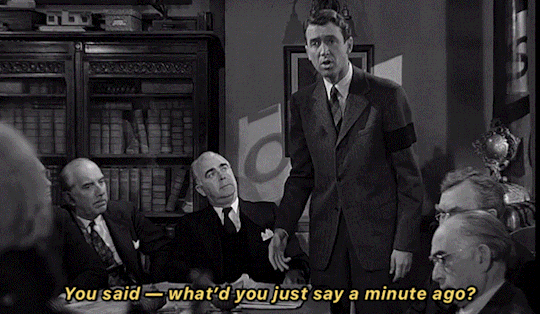
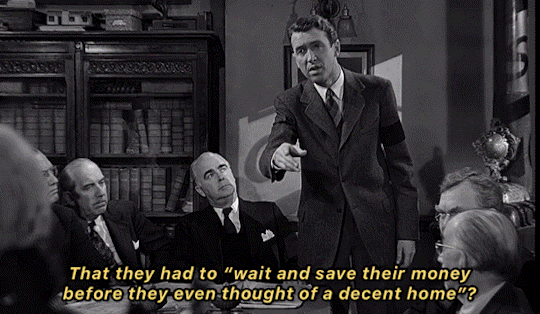
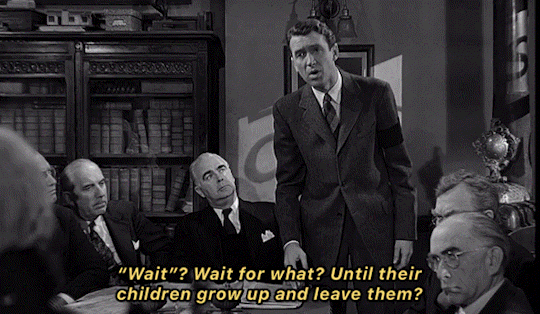
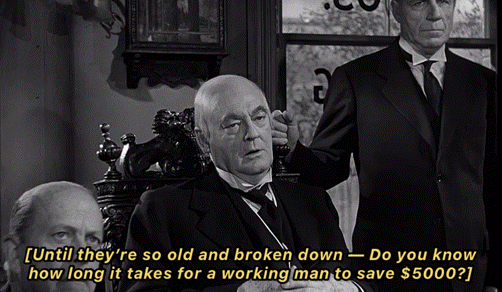

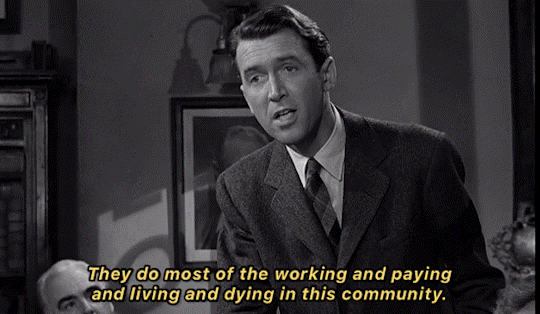
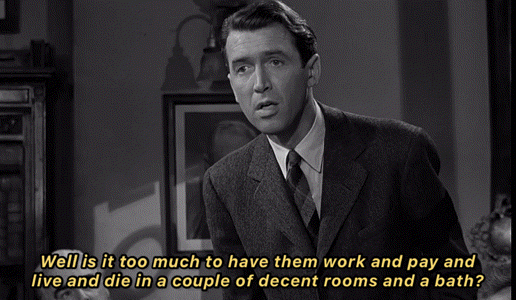
IT’S A WONDERFUL LIFE (1946) • JIMMY STEWART as George Bailey and LIONEL BARRYMORE as Mr. Potter
122K notes
·
View notes
Text

"There is enough in the world for everyone's need, but not enough for everyone's greed." 🎯🌀👍
Frank Buchman
1 note
·
View note
Text
So, here's the conclusion I've come to as a student and researcher who has studied the script history of Merrily.
"Not a Day Goes By" was written very early in Merrily's development history. From Furth's earliest draft (dated September 1980) it exists in the courthouse scene that ends Act 1 (sung by Beth) and as a reprise in the wedding scene (mostly a solo for Frank, paired with their duet "Honey"). This is essentially how it was through rehearsals and into the preview period - Beth still sang the song (and if you listen to the audio of the second preview, you can hear this!)
But, seemingly, Sondheim and Gemignani realized that Sally Klein's upper register wasn't strong enough to support the song. She could sing it, but she got thin and less powerful. So they made the decision to rewrite the scene so Jim Walton would sing it instead. Everyone seems to have understood this as a temporary change: when the show was released for licensing in 1982, the song had been given back to Beth. The lyrics as currently sung are the original lyrics, and those heard on the original cast album are brief replacements so Frank could sing the song. It's sort of unclear why they would have had to reassign the song instead of changing the key: maybe it was too late; maybe Klein's voice couldn't do it in any key. For later productions Sondheim was in favor of lowering the song as far as needed to land well in the singer's voice. (The 1994 cast recording, which corresponds to the current license as of November 2024, has the song an entire perfect fifth down from its original key, and Bernadette Peters' famous rendition is a fourth down.)
I might give an aside to talk about the song's reprise in Act 2: while this instance of the song is present from the earliest drafts, its use as a duet for Frank and Mary doesn't emerge until the preview period. For reasons I don't totally understand (Furth never mentions them in his papers to my memory) the decision was made when the show was first being drafted to cut the idea that Julia (the 1934 play's equivalent to Mary) is in love with Richard (= Frank), but this was reinstated during previews by the rewrite of the "Not a Day Goes By" reprise (possibly corresponding to cutting "Honey"). This corresponds to a number of changes throughout: in the drafts it is Charley who sings the "Old Friends" preprise in the restaurant scenes, but during previews this shifts to Mary and I wouldn't be surprised if these were part of the same decision.
For what it's worth, I find Sondheim a bit unreliable in his description of Merrily's history in Finishing the Hat, as other researchers have pointed out before me (if you are interested in further research, you can see Dr. Andrew Buchman's two scholarly articles on the topic). He states, for instance, that "Honey" and "Darling" were cut during or before rehearsals respectively, when there are audio recordings proving that both were present during the preview period. It's unclear to me why this might be: Sondheim is incredibly detailed and correct at other points, but it may well be that the story of the development of Merrily was too confusing and too painful to recall correctly.
I don't get the story behind "Not a Day Goes By." In the original production, Frank sings it. In subsequent productions, Beth sings it. In Look, I Made a Hat, Sondheim talked about some big changes he made from the original production to the revised version in 1985, but he listed the song with Beth singing it and didn't mention a change there. In Sondheim on Music, he talked about writing it for Beth. So why did Frank sing it in the original production?
15 notes
·
View notes
Text
Through the Looking Glass
Above, from left: When Teddy Roosevelt announced in 1912 that he would run for president against his former VP, William Howard Taft, Brown Brothers sent photographer Charles Duprez to Oyster Bay to take this famous photo; President Taft and his wife, Helen “Nellie” Taft, in 1909; famed New York Giants pitcher Christy Mathewson warms up before a game, circa 1912.…

View On WordPress
#Abe Birnbaum#Alan Dunn#Alice Frankforter#Barbara Shermund#Brown Brothers#Constantin Alajalov#Dorothy Draper#E.B. White#Edmund Wilson#Fanny Brice#Frank Buchman#Garrett Price#Hattie Carnegie#Hockey 1934#Howard Brubaker#Hudson Terraplane#Hugo Gellert#James Thurber#John Dillinger#Lewis Mumford#Lois Long#Mary Petty#Nancy Hardin#Otto Soglow#Oxford Group#Peter Arno#Rea Irvin#Richard Decker#Robert Day#Whoops Sisters
1 note
·
View note
Text

Glenn Close: La mia terribile infanzia in una setta
Glenn Close è cresciuta in una setta religiosa: la Moral Re-Armament. Introdotta nell’organizzazione religiosa dal defunto padre William Taliaferro quando aveva appena 7 anni, vi rimase fino ai 22.
Per un periodo ha anche vissuto nei quartieri generali dell’organizzazione in Svizzera, per poi lasciare definitivamente la setta nel 1970.
Ora Close, 74 anni, in una puntata della docuserie sulla salute mentale ‘The Me You Can’t See‘ prodotta da Oprah Winfrey e dal principe Harry ha svelato che quell’esperienza “terribile” l’ha segnata per tutta la vita: “Sono cresciuta in questo gruppo chiamato MRA. Praticamente era una setta in cui tutti dicevano le stesse cose e il controllo era a livelli altissimi”.
Fondato nel 1938 dal pastore luterano statunitense Frank Buchman, il gruppo basava la sua forza su 4 principi: onestà, purezza, altruismo e amore. “Qualsiasi cosa facessimo per noi stessi era considerata negativa ed egoista. Non potevamo mai andare in vacanza e non ci era permesso accumulare ricordi sotto forma di oggetti. Non era permesso fare nulla, mi facevano sentire in colpa per qualsiasi desiderio considerato innaturale. Era terribile“, ha raccontato Close.
L’attrice, pluricandidata agli Oscar, che ha alle spalle 3 matrimoni (con Cabot Wade, James Constantine Marlas e David Show) è convinta che la sua incapacità di costruire un legame duraturo sia legata proprio agli anni vissuti nella setta: “È incredibile come un trauma infantile possa risultare devastante per una vita intera“.
#Glenn Close#Moral Re Armament#Svizzera#‘The Me You Can’t See#Oprah Winfrey#MRA#Frank Buchman#Cabot Wade#James Constantine Marlas#David Show#setta
0 notes
Text

"PATTULLO WELCOMES OXFORD GROUPERS," Vancouver Sun. May 28, 1934. Page 7. ---- GREAT INTEREST IN MOVEMENT, SAYS PREMIER ---- VICTORIA, May 28. - "This vast audience is evidence of the great interest that is being manifested in the Oxford Group movement. We are probably living in a period of far reaching importance a period of evolution in the history of the world. We are perhaps too close to the situation to grasp all its implications," Premier T. D. Pattullo said, in his opening remarks, when welcoming Dr. Frank N. D. Buchman, founder and leader of the movement, and his Colleagues to Victoria, at a meeting held in the Royal Victoria Theatre, Sunday night.
"It is rather an anomaly that all the nations of the world should be advocating international goodwill and peace, and yet all adopting an opposite course of action," the Premier continued.
"If we are to produce good will among nations, then we have to have good will in the hearts of the individuals. I find myself in great sympathy with all endeavors inculcated with the spirit of goodwill."
More than one hundred members of the group from London arrived in Victoria Saturday. They are on tour of Canada and the United States and held meetings here at various churches throughout the day.
Their final meeting was held at the Empress Hotel Sunday evening and the groupers left at midnight for Vancouver.
Leader HALLEN VINEY, M.A. Once a chaplain in the Royal Naval Volunteer Reserves, Hallen Viney, one of the best known members of the Oxford Group's International Team, is an M.A. from Downing College, Cambridge University. A leader in the organization work of the group, he made a wide circle of acquaintances during his first visit to Vancouver with the Oxford Group team a year ago.
#vancouver#oxford group#frank buchman#new religious movement#lutheranism#lutheran sect#high society sect#great depression in canada#christianity in canada
1 note
·
View note
Text
On Marshall Frothingham: Former MRA, Early U.S. Moonie
A testimony of Marshall Frothingham from the January 1968 issue of the Moonie publication New Age Frontiers

I first met the Divine Principle in February when my cousin happened to recognize me at a church coffee hour. This would not be so surprising except that we had had no contact with each other for years and she recognized me only because of snapshots in a family album.
At the time I was attending meetings of "Sing-Out, Washington" (affiliated with Moral Re-Armament), and because of the spirit and enthusiasm of the people in it and the songs they sang, I really felt that "Sing-Out" could provide an answer, or at least a part of the answer, to man's problems. From their songs and speeches, the members said theirs was an ideology superior to those advocated by bigots, dictators, and Communists because MRA advocated liberty, equality and fraternity for all mankind (though not in those exact words). My only objection was that they rarely gave any credit to, or even made mention of, the Father. For this reason, I worked in MRA and attended church, hoping the combination would prove to be effective.
Then when I met the Family, I saw it at first only as another group like the MRA, and tried to combine the three. (Later I joined the Civil Air Patrol, and for a couple of months I don't know how I ever kept track of all the different meetings I was supposed to attend.) Unfortunately, it took me a long time to grasp the extent of the difference and to realize how much more the Divine Principle had to offer and how important it was that everyone spread the teachings of the Principle in whatever ways possible.
This, then, is what I feel our job is: To understand the Principle so well that all our thoughts and actions are directed toward bringing all mankind into the proper relationship with the Father, with themselves, and with the rest of the universe.
Related articles and notes below
On the Unification Church Inheriting the Moral Re-Armament Movement’s Role (and Resources on the MRA)
The Imperial Ghost in the Neoliberal Machine (Figuring the CIA)
Happiness ginseng from earth-conquering Moonies – Japan 1978:
It may be recalled that Kishi, once a key figure in General Tojo’s World War II cabinet, became one of the most passionate spokesmen for Dr Frank Buchman’s Moral Rearmament (MRA) in 1950s and 1960s. The striking similarity between the moral precepts and secular programmes of MRA and Moon’s church is of interest here because the latter was born as an international movement at the very time when MRA was swiftly declining in Japan. Following the upheaval over the Security Treaty in 1960, which forced his resignation as prime minister, Kishi declared with characteristic hyperbole: “But for Moral Rearmament, Japan would be under communist control today.” Curiously, little was heard about MRA after the early 1960s. Instead, there was much bombast about the Asian People’s Anticommunist League, in which Kishi played the same role as elder statesman and spokesman. There are reports that in 1959 or thereabouts Moon played go-between for an alliance between the MRA leadership and the APACL. When the World Anticommunist League and IFFVOC were formed in the late 1966 and 1967 respectively, Kishi again came to the fore, and today he is front man for the Day of Hope.
From a UC obituary for Marshall Buxton Frothingham (March 5, 1986):
Marshall Frothingham's numerous activities in the Unification Church spanned the years from 1968 to 1986. Elder American church members have vivid memories of his cheerful contributions to early pioneering work, and the staff of the New York City Tribune fondly recall his loyal participation in the first years of the newspaper. Fellow families of the 1800 Couples Blessing treasure his dedication to the cause of unity, especially among blessed families.
Although he was never known to complain of his suffering, Marshall's entire life since babyhood was made difficult by chronic bronchial asthma, at times so severe as to make for a day-to-day struggle for survival. However, he chose not to be pampered, but instead always went out of his way to help others, even beyond the apparent limits imposed by a frail body, and always with effervescent good humor.
In the early hours of March 5, 1986, Marshall succumbed to one final attack of asthma at his home in the World Mission Center, where he lived with his wife Gloria and their one-year-old son Stephen Patrick. His Seunghwa ceremony was held in New York City, where President Mose Durst, Rev. Ken Sudo, and several other members gave moving testimonies to his stamina, his faith, and his example of fearlessness. All who were close to him share a sense of victory and joy in Marshall's Seunghwa. It is already clear that he will continue to work devotedly for the providence, as a testimony to the triumph of the living spirit.
#mra#Moral Re-Armament Movement#moral re-armament#moonies#unification church in the united states of america#unification church in the united states#unification church in usa#1968#sing out#testimony#american church#new age frontiers
0 notes
Photo


Sidney Buchman, the screenwriter of Mr. Smith Goes to Washington, recalled a discussion he had with director Frank Capra while writing the film:
“One day he came to see me in my room and we talked about Smith. I tried to show him what I meant to say, that it is necessary to maintain a vigilant attitude even when you think you are living in a democracy … He looked at me and said, ‘Go get fucked with your theme!’”
13 notes
·
View notes
Photo

You see, boys forget what their country means by just reading The Land of the Free in history books. Then they get to be men they forget even more. Liberty's too precious a thing to be buried in books, Miss Saunders. Men should hold it up in front of them every single day of their lives and say: I'm free to think and to speak. My ancestors couldn't, I can, and my children will. Boys ought to grow up remembering that.
Mr. Smith Goes to Washington, Frank Capra (1939)
#Frank Capra#Sidney Buchman#Jean Arthur#James Stewart#Claude Rains#Edward Arnold#Guy Kibbee#Thomas Mitchell#Eugene Pallette#Beulah Bondi#H.B. Warner#Joseph Walker#Dimitri Tiomkin#Al Clark#Gene Havlick#1939
3 notes
·
View notes
Text
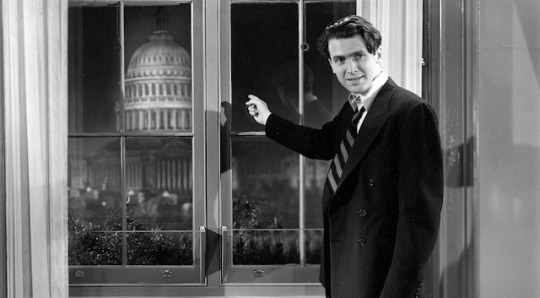
James Stewart in Mr. Smith Goes to Washington (Frank Capra, 1939)
Cast: James Stewart, Jean Arthur, Claude Rains, Edward Arnold, Guy Kibbee, Thomas Mitchell, Eugene Pallette, Beulah Bondi, H.B. Warner, Harry Carey, Astrid Allwyn, Ruth Donnelly, Grant Mitchell, Porter Hall, H.V. Kaltenborn, Charles Lane, William Demarest, Jack Carson. Screenplay: Sidney Buchman, based on a story by Lewis R. Foster. Cinematography: Joseph Walker. Art direction: Lionel Banks. Film editing: Al Clark, Gene Havlick. Music: Dimitri Tiomkin.
Perhaps only James Stewart (or Gary Cooper, who turned down the role of Jefferson Smith) could have made Frank Capra's preposterous, sentimental, flag-wavingly patriotic Mr. Smith Goes to Washington into what many people still regard as a beloved classic. But now that we've spent some time being governed by probably the most corrupt man ever to hold the White House, a president elected on populist promises to "drain the swamp" in Washington but who instead spent his time wallowing in it and stocking it with still more alligators, maybe we can take a harsher look at the Capra film's politics. The people who elected Donald Trump seem to have thought they were voting for Jefferson Smith but instead elected the movie's Jim Taylor (played deliciously by that fattest of character actor fat cats, Edward Arnold). David Thomson, among others, has cogently observed that the film celebrates Jefferson Smith's bull-headed integrity, but that democracy necessarily involves the kind of compromises that Claude Rains's Senator Paine has made, and which have made him a popular and successful politician. True, he's under the thumb of the viciously corrupt Jim Taylor, who is even a manipulator of "fake news," but Thomson questions whether the people of Smith's state wouldn't have benefited more from the dam Taylor wants to put on Willett Creek, presumably one that would supply power and other benefits to the state, than from Smith's piddly boys' camp, which would benefit at best a few hundred boys. (No girls need apply?) Smith's dramatic filibuster also seems to be holding up a bill that would provide funding for some essential services. As it happens, I rewatched Mr. Smith on the night after the Senate reached an impasse on funding the entire federal government, and there could hardly be a better example of political stubbornness undermining the public good. Which is only to say that the merits of Capra's film -- and there are some -- transcend its simple-minded fable. Among its merits, it's beautifully acted, not only by Stewart, Rains, and Arnold, but also by Jean Arthur, that most underrated of 1930s leading ladies, and Thomas Mitchell, who appeared in no fewer than three of the films nominated for the best picture Oscar for 1939 -- this one, Gone With the Wind (Victor Fleming), and Stagecoach (John Ford) -- and won the supporting actor award for Stagecoach. And just run down the rest of the cast list, which seems to be a roster of every great character actor in the movies of that day, all of them performing with great energy. Capra's mise-en-scène is sometimes stagy, but Lionel Banks's great re-creation of the Senate chamber gives Capra a fine stage on which to work.
7 notes
·
View notes
Text
Kwame Nkrumah on the methods of neo-colonialism (from Neo-Colonialism, the Last Stage of Imperialism):
Some of these methods used by neo-colonialists to slip past our guard must now be examined. The first is retention by the departing colonialists of various kinds of privileges which infringe on our sovereignty: that of setting up military bases or stationing troops in former colonies and the supplying of ‘advisers’ of one sort or another. Sometimes a number of ‘rights’ are demanded: land concessions, prospecting rights for minerals and/or oil; the ‘right’ to collect customs, to carry out administration, to issue paper money; to be exempt from customs duties and/or taxes for expatriate enterprises; and, above all, the ‘right’ to provide ‘aid’. Also demanded and granted are privileges in the cultural field; that Western information services be exclusive; and that those from socialist countries be excluded.
Even the cinema stories of fabulous Hollywood are loaded. One has only to listen to the cheers of an African audience as Hollywood’s heroes slaughter red Indians or Asiatics to understand the effectiveness of this weapon. For, in the developing continents, where the colonialist heritage has left a vast majority still illiterate, even the smallest child gets the message contained in the blood and thunder stories emanating from California. And along with murder and the Wild West goes an incessant barrage of anti-socialist propaganda, in which the trade union man, the revolutionary, or the man of dark skin is generally cast as the villain, while the policeman, the gum-shoe, the Federal agent — in a word, the CIA — type spy is ever the hero. Here, truly, is the ideological under-belly of those political murders which so often use local people as their instruments.
While Hollywood takes care of fiction, the enormous monopoly press, together with the outflow of slick, clever, expensive magazines, attends to what it chooses to call ‘news. Within separate countries, one or two news agencies control the news handouts, so that a deadly uniformity is achieved, regardless of the number of separate newspapers or magazines; while internationally, the financial preponderance of the United States is felt more and more through its foreign correspondents and offices abroad, as well as through its influence over inter-national capitalist journalism. Under this guise, a flood of anti-liberation propaganda emanates from the capital cities of the West, directed against China, Vietnam, Indonesia, Algeria, Ghana and all countries which hack out their own independent path to freedom. Prejudice is rife. For example, wherever there is armed struggle against the forces of reaction, the nationalists are referred to as rebels, terrorists, or frequently ‘communist terrorists'!
Perhaps one of the most insidious methods of the neo-colonialists is evangelism. Following the liberation movement there has been a veritable riptide of religious sects, the overwhelming majority of them American. Typical of these are Jehovah’s Witnesses who recently created trouble in certain developing countries by busily teaching their citizens not to salute the new national flags. ‘Religion’ was too thin to smother the outcry that arose against this activity, and a temporary lull followed. But the number of evangelists continues to grow.
Yet even evangelism and the cinema are only two twigs on a much bigger tree. Dating from the end of 1961, the U.S. has actively developed a huge ideological plan for invading the so-called Third World, utilising all its facilities from press and radio to Peace Corps.
During 1962 and 1963 a number of international conferences to this end were held in several places, such as Nicosia in Cyprus, San Jose in Costa Rica, and Lagos in Nigeria. Participants included the CIA, the U.S. Information Agency (USIA), the Pentagon, the International Development Agency, the Peace Corps and others. Programmes were drawn up which included the systematic use of U.S. citizens abroad in virtual intelligence activities and propaganda work. Methods of recruiting political agents and of forcing ‘alliances’ with the U.S.A. were worked out. At the centre of its programmes lay the demand for an absolute U.S. monopoly in the field of propaganda, as well as for counteracting any independent efforts by developing states in the realm of information.
The United States sought, and still seeks, with considerable success, to co-ordinate on the basis of its own strategy the propaganda activities of all Western countries. In October 1961, a conference of NATO countries was held in Rome to discuss problems of psychological warfare. It appealed for the organisation of combined ideological operations in Afro-Asian countries by all participants.
In May and June 1962 a seminar was convened by the U.S. in Vienna on ideological warfare. It adopted a secret decision to engage in a propaganda offensive against the developing countries along lines laid down by the U.S.A. It was agreed that NATO propaganda agencies would, in practice if not in the public eye, keep in close contact with U.S. Embassies in their respective countries.
Among instruments of such Western psychological warfare are numbered the intelligence agencies of Western countries headed by those of the United States ‘Invisible Government’. But most significant among them all are Moral Re-Armament QARA), the Peace Corps and the United States Information Agency (USIA).
Moral Re-Armament is an organisation founded in 1938 by the American, Frank Buchman. In the last days before the second world war, it advocated the appeasement of Hitler, often extolling Himmler, the Gestapo chief. In Africa, MRA incursions began at the end of World War II. Against the big anti-colonial upsurge that followed victory in 1945, MRA spent millions advocating collaboration between the forces oppressing the African peoples and those same peoples. It is not without significance that Moise Tshombe and Joseph Kasavubu of Congo (Leopoldville) are both MRA supporters. George Seldes, in his book One Thousand Americans, characterised MRA as a fascist organisation ‘subsidised by . . . Fascists, and with a long record of collaboration with Fascists the world over. . . .’ This description is supported by the active participation in MRA of people like General Carpentier, former commander of NATO land forces, and General Ho Ying-chin, one of Chiang Kai-shek’s top generals. To cap this, several newspapers, some of them in the Western ;vorld, have claimed that MRA is actually subsidised by the CIA.
When MRA’s influence began to fail, some new instrument to cover the ideological arena was desired. It came in the establishment of the American Peace Corps in 1961 by President John Kennedy, with Sargent Shriver, Jr., his brother-in-law, in charge. Shriver, a millionaire who made his pile in land speculation in Chicago, was also known as the friend, confidant and co-worker of the former head of the Central Intelligence Agency, Allen Dulles. These two had worked together in both the Office of Strategic Services, U.S. war-time intelligence agency, and in the CIA.
Shriver’s record makes a mockery of President Kennedy’s alleged instruction to Shriver to ‘keep the CIA out of the Peace Corps’. So does the fact that, although the Peace Corps is advertised as a voluntary organisation, all its members are carefully screened by the U.S. Federal Bureau of Investigation (FBI).
Since its creation in 1961, members of the Peace Corps have been exposed and expelled from many African, Middle Eastern and Asian countries for acts of subversion or prejudice. Indonesia, Tanzania, the Philippines, and even pro-West countries like Turkey and Iran, have complained of its activities.
However, perhaps the chief executor of U.S. psychological warfare is the United States Information Agency (USIA). Even for the wealthiest nation on earth, the U.S. lavishes an unusual amount of men, materials and money on this vehicle for its neo-colonial aims.
The USIA is staffed by some 12,000 persons to the tune of more than $130 million a year. It has more than seventy editorial staffs working on publications abroad. Of its network comprising 110 radio stations, 60 are outside the U.S. Programmes are broadcast for Africa by American stations in Morocco, Eritrea, Liberia, Crete, and Barcelona, Spain, as well as from off-shore stations on American ships. In Africa alone, the USIA transmits about thirty territorial and national radio programmes whose content glorifies the U.S. while attempting to discredit countries with an independent foreign policy.
The USIA boasts more than 120 branches in about 100 countries, 50 of which are in Africa alone. It has 250 centres in foreign countries, each of which is usually associated with a library. It employs about 200 cinemas and 8,000 projectors which draw upon its nearly 300 film libraries.
This agency is directed by a central body which operates in the name of the U.S. President, planning and coordinating its activities in close touch with the Pentagon, CIA and other Cold War agencies, including even armed forces intelligence centres.
In developing countries, the USIA actively tries to prevent expansion of national media of information so as itself to capture the market-place of ideas. It spends huge sums for publication and distribution of about sixty newspapers and magazines in Africa, Asia and Latin America.
The American government backs the USIA through direct pressures on developing nations. To ensure its agency a complete monopoly in propaganda, for instance, many agreements for economic co-operation offered by the U.S. include a demand that Americans be granted preferential rights to disseminate information. At the same time, in trying to close the new nations to other sources of information, it employs other pressures. For instance, after agreeing to set up USIA information centres in their countries, both Togo and Congo (Leopoldville) originally hoped to follow a non-aligned path and permit Russian information centres as a balance. But Washington threatened to stop all aid, thereby forcing these two countries to renounce their plan.
Unbiased studies of the USIA by such authorities as Dr R. Holt of Princeton University, Retired Colonel R. Van de Velde, former intelligence agents Murril Dayer, Wilson Dizard and others, have all called attention to the close ties between this agency and U.S. Intelligence. For example, Deputy Director Donald M. Wilson was a political intelligence agent in the U.S. Army. Assistant Director for Europe, Joseph Philips, was a successful espionage agent in several Eastern European countries.
Some USIA duties further expose its nature as a top intelligence arm of the U.S. imperialists. In the first place, it is expected to analyse the situation in each country, making recommendations to its Embassy, thereby to its Government, about changes that can tip the local balance in U.S. favour. Secondly, it organises networks of monitors for radio broadcasts and telephone conversations, while recruiting informers from government offices. It also hires people to distribute U.S. propaganda. Thirdly, it collects secret information with special reference to defence and economy, as a means of eliminating its international military and economic competitors. Fourthly, it buys its way into local publications to influence their policies, of which Latin America furnishes numerous examples. It has been active in bribing public figures, for example in Kenya and Tunisia. Finally, it finances, directs and often supplies with arms all anti-neutralist forces in the developing countries, witness Tshombe in Congo (Leopoldville) and Pak Hung Ji in South Korea. In a word, with virtually unlimited finances, there seems no bounds to its inventiveness in subversion.
One of the most recent developments in neo-colonialist strategy is the suggested establishment of a Businessmen Corps which will, like the Peace Corps, act in developing countries. In an article on ‘U.S. Intelligence and the Monopolies’ in International Affairs (Moscow, January 1965), V. Chernyavsky writes: ‘There can hardly be any doubt that this Corps is a new U.S. intelligence organisation created on the initiative of the American monopolies to use Big Business for espionage. It is by no means unusual for U.S. Intelligence to set up its own business firms which are merely thinly disguised espionage centres. For example, according to Chernyavsky, the C.I.A. has set up a firm in Taiwan known as Western Enterprises Inc. Under this cover it sends spies and saboteurs to South China. The New Asia Trading Company, a CIA firm in India, has also helped to camouflage U.S. intelligence agents operating in South-east Asia.
Such is the catalogue of neo-colonialism’s activities and methods in our time. Upon reading it, the faint-hearted might come to feel that they must give up in despair before such an array of apparent power and seemingly inexhaustible resources.
Fortunately, however, history furnishes innumerable proofs of one of its own major laws; that the budding future is always stronger than the withering past. This has been amply demonstrated during every major revolution throughout history.
34 notes
·
View notes
Text
I’LL LOVE YOU ALWAYS
March 20, 1935

Directed by Leo Bulgakov
Writers: Lawrence Hazard (story), Vera Caspary, Sidney Buchman
Produced by Everett Riskin for Columbia Pictures
Synopsis ~ Actress Nora Clegg marries Carl Brent, an unemployed young engineer, whose estimation of his worth and ability keeps him from getting a job. He finally acquires a position that will require him to go to Russia for a period of time, while Nora goes back to the stage during his absence. But he loses out on the job at the last minute, and rather than tell Nora he has failed again, he steals money from his prospective employer to lavish on Nora before his ‘supposed’ departure. His goes to jail and hides the truth from Nora by having an acquaintance mail his letters from Russia. He then finds out that Nora is pregnant.
PRINCIPAL CAST
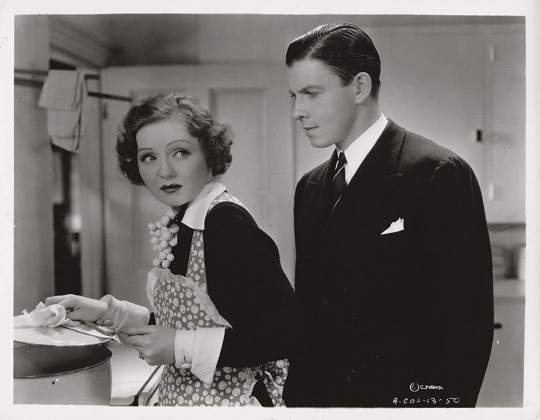
Nancy Carroll (Nora Clegg) was nominated for an Oscar in 1930 for The Devil’s Holiday. She also appeared with Lucille Ball in Jealousy (1934).
George Murphy (Carl Brent) appeared with Lucille Ball in Jealousy and Kid Millions, both in 1934. They also were in A Girl, A Guy, and a Gob in 1941, as well as two radio adaptations of the film. In 1959, Murphy served as guest host of “The Westinghouse Desilu Playhouse” when Desi Arnaz took a role in his own anthology series. He was also a performer in “The Desilu Revue” aired in December 1959. As the host of “MGM Parade”, he interviewed Lucy and Desi in February 1956.
Raymond Walburn (Charlie) previously appeared with Lucille Ball in Broadway Bill (1934), Jealousy (1934), and Lover Come Back (1946).
Arthur Hohl (Jergens) previously appeared with Lucille Ball in Bulldog Drummond Strikes Back (1934), Jealousy (1934), and The Whole Town’s Talking (1935).
Jean Dixon (Mae Waters) would also appear with Lucille Ball in Joy of Living (1938).
Robert Allen (Joe) previously appeared with Lucille Ball in Broadway Bill (1934) and Jealousy (1934).
Harry Beresford (Mr. Clegg) would appear with Lucille Ball in Follow The Fleet (1936).
Paul Harvey (Sandstone) appeared in seven films with Lucille Ball. He played the art critic in “Lucy the Sculptress” (ILL S2;E15).
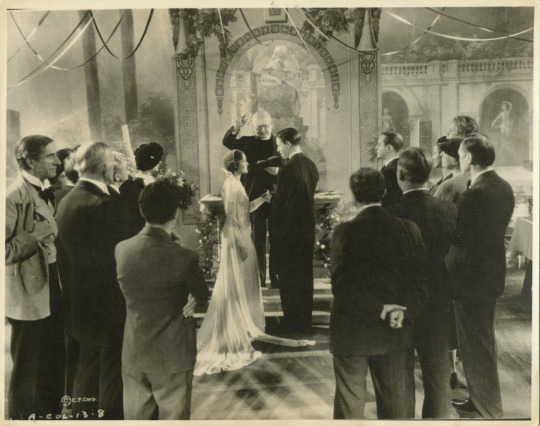
UNCREDITED CAST
Lucille Ball (Lucille) appears in her 20th feature film since coming to Hollywood in 1933.
Eadie Adams...Singer
Irving Bacon (Theater Manager) did seven films with Lucille Ball before playing Mr. Willoughby in in “The Marriage License” (1952) and Will Potter in “Ethel’s Hometown” (1955).
Eddie Baker...Doorman
Elaine Baker...Sandstone's Secretary
John Beck...Ghost
Yvonne Bertrand...Operator
Stanley Blystone...Bill Collector
Sven Hugo Borg...Hamlet
Lynton Brent...Laertes
Helen Brown...Worker
Steve Clark...Bill Collector
Claudia Coleman...Francine
Gino Corrado...Waiter
D'Arcy Corrigan...Waiter
Pearl Eaton...Gertrude
Vessie Farrell...Jenny
Budd Fine...Furniture Man
Sam Flint...First Business Man
Mary Foy...Kitty
Frankie Genardi...Shoeshine Boy
Adda Gleason...Manager
Grace Goodall...Sarah
Roger Gray...Foreman
Howard Hickman...Dean
Samuel E. Hines...Bank Teller
Alfred P. James...Canby
Ethan Laidlaw...Cab Driver
W.E. Lawrence...Furniture Salesman
Edward LeSaint...Minister
Otto Malde...Steward
Frank Marlowe...Bellhop
Adrian Morris...Pigface
Bruce Randall...Waiter
Jack Richardson...Bartender
Billie Van Every...Mary
John Paul Jones, Moselle Kimbler, Lon Poff, Bert Starkey, Charles Marsh, Elaine Waters, Gay Waters
“LOVE” TRIVIA
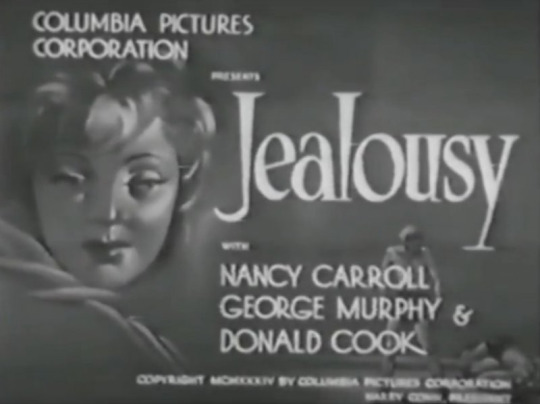
All but three of the principal cast members also appeared with Lucille Ball in Jealousy in 1934.
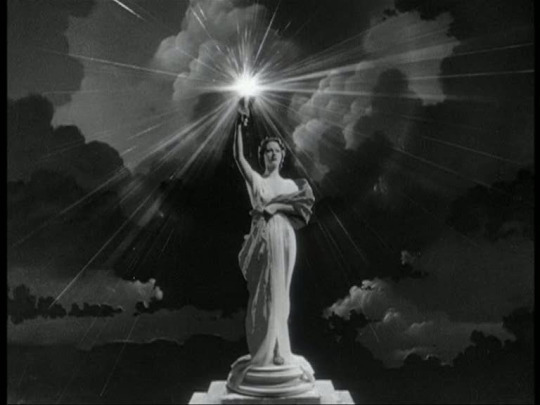
During her brief period at Columbia, Lucille Ball logged in miniscule roles in eight feature films and three shorts. It is fair to say that Columbia and her torch got more screen time than Lucille!
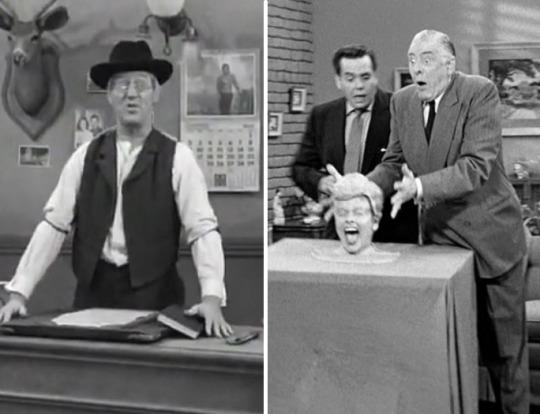
Irving Bacon (Theatre Manager) and Paul Harvey (Sandstone) were the only two cast members to later appear on “I Love Lucy”.
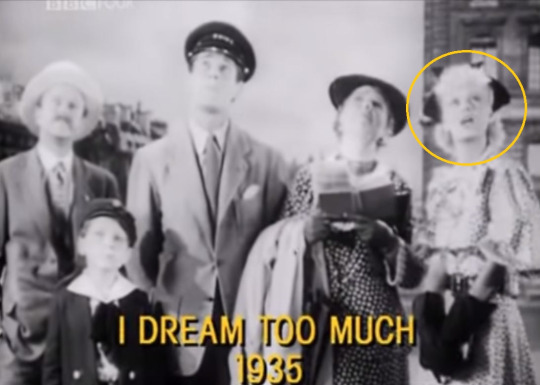
This is just one of 13 films (including three shorts) featuring Lucille Ball to be released in 1935. All except I Dream Too Much were uncredited:
Behind the Evidence (Secretary)
Carnival (Nurse)
Hooray For Love (Chorine)
The Whole Town's Talking (Bank Employee)
Roberta (Fashion Model)
I'll Love You Always (Lucille)
Old Man Rhythm (College Girl)
Top Hat (Flower Clerk)
The Three Musketeers (Extra)
Foolish Heart - short (Hat Check Girl)
His Old Flame - short
A Night At The Biltmore Ball - short (Lucille Ball)
I Dream Too Much (Gwendolyn Dilley) - Lucille Ball’s first on screen credit
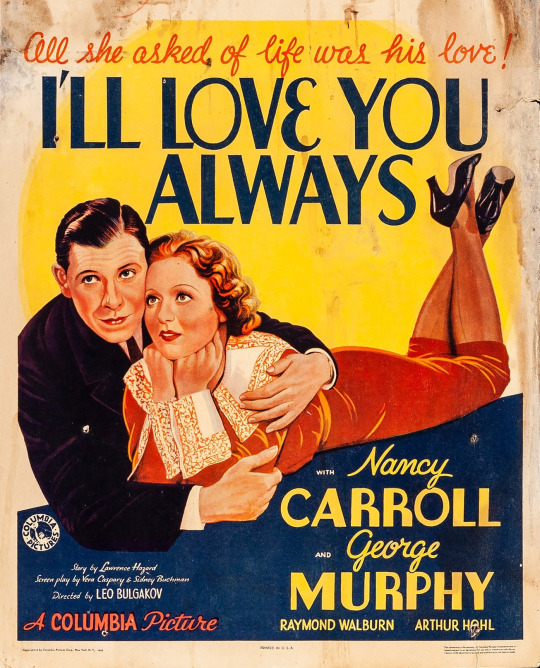
#Lucille Ball#I'll Love You Always#Columbia Studios#George Murphy#Nancy Carroll#Irving Bacon#Leo Bulgakov#Arthur Hohl#Raymond Walburn#Paul Harvey#1935
2 notes
·
View notes
Photo

“‘House Parties’ Form Religious Ceremony,” North Bay Nugget. May 4, 1932. Page 7. ---- Bushman's Christian Fellowship Movement is Fast Gaining Followers --- IN LUXURIOUS RESORT ---- Banned For Drawing “Group Confessions From Undergraduates” --- Briarcliff Manor, N.Y., May 4 --Under the approving eye of the Rev. Frank N. B. Buchman, enthusiastic high priest of the religious movement known as "a First Century Christian Fellowship," the saving of soul is progressing at a great rate here.
Some 500 men Mid women an imported term of "experts" or leaders, are attending one of Dr. Buchman's famous “house parties” at Briarcliff Lodge. luxurious country resort.
There are ministers of various Protestant denomination, elderly ladies come to commune directly with God, purposeful young women with horn-rimmed spectacles and busy notebooks, a few Junior Leaguers, a Dutch count, a British army colonel, a reformed bootlegger named Bill, several school teachers, a couple of baronesses, lots of business men who understand that a spiritual revival must come before a trade revival and a great many young men in, or just out, of college.
In Modern Attire The house party is a ramp meeting in modem dress and conduct with Oriental rugs instead of a sawdust trail and quiet, earnest discussion, instead of the shouting of old-time revivals. But there is informality, too, backslapping, handshaking, and smiles. Everyone calls everyone else by his first name. There never are enough chairs at the various meetings, so people sit on the floor.
This is Dr. Buchman's first visit to the United States in two years. Abroad his movement is known as “The Oxford Groups.” In this country, where the idea started after a divine revelation came to him in 1908, it is popularly called Buchmanism .
An ordained Lutheran minister and a native of Pennsylvania, he now is 53 yars old, well-fed, partly bald, vigorous, commanding of manner, and fairly radiates good nature and love for his fellow beings. He defines his idea as “unreserved acceptance of the principles of the New Testament.” It is a personal evangelism, and one of its chief tenets is "sharing," which means the confession of sin.
Group Confession Since most sins are sex sins, it was this policy of group confession which brought Dr. Buchman under widespread criticism when he was operating in this country before. He was banned from Princeton University as a result of confessions alleged to have been drawn from undergraduates.
Now, however, less emphasis is being placed on this phase of the movement. At least, red-hot confessions no longer are being encouraged at mixed gatherings.
"God -Guidance” is an important part of the movement and to receive these Divine messages, Dr. Buchman has a “Quiet Time" observed at the meetings. Here at Briarcliff Lodge, all of the house party guests gather in the ballroom after an early breakfast to hear a short Inspirational address by one of the leaders. Then there is a long period of silence while the converts transcribe in their notebooks advice and counsel emanating from the Holy Spirit.
From meeting to meeting goes Dr. Buchman, beaming on converts and lagards alike, distributing blessings and encouragement. This has been an unusually satisfactory house party, he says, and now is making plans to go farther afield. There will he house parties in Washington, Richmond, Boston, Philadelphia and probably several points west.
[More about Buchman here and the Oxford Group here.
#briarcliff manor#westchester county#oxford group#frank buchman#new religious movement#lutheranism#lutheran sect#high society sect#house party#the great depression#united states history
0 notes
Text
Machine Guns Near the Church of Scientology’s Int Base or Gold Base

Ex-Scientologist Mark Headley confirmed that there are men with machine guns near the Int Base but these aren’t Scientologists, but the U.S. Government. Apparently there is some sort of secret project or base right next to Scientology’s Int Base.
It is odd how this is seen as coincidental by a lot of them. Miles Copeland Jr. had claimed that the CIA and Scientology had a strong relationship, as well as with the MRA.
Some, like the late Ed Coffman, believed that the Unification Church inherited the MRA’s mission and CIA support as Frank Buchman passed in 1961.
#int base#gold base#scientology#church of scientology#ex-scientologist#cia#ed coffman#miles copeland#frank buchman
8 notes
·
View notes